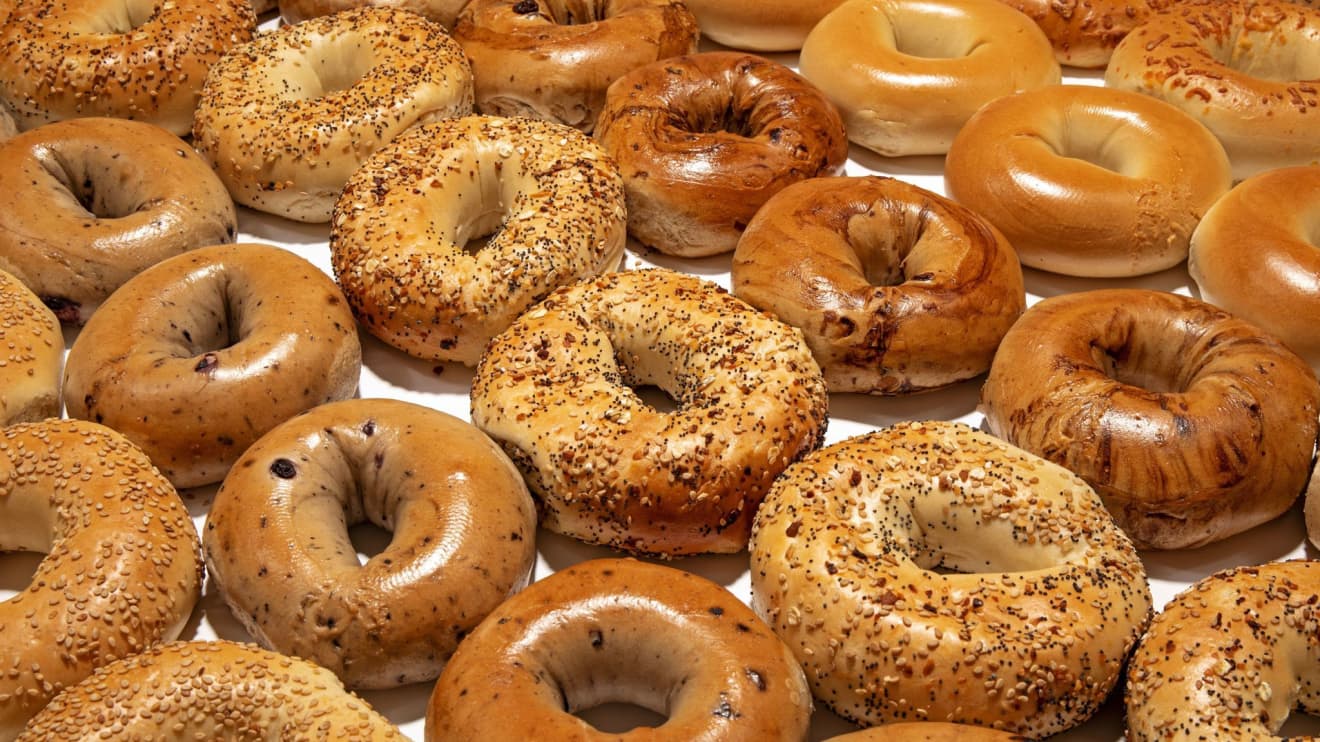This post was originally published on this site
For generations, Jewish families have enjoyed a weekend spread of bagels with cream cheese, smoked salmon and other accompaniments. It is also the same spread often associated with the breaking of the fast on Yom Kippur, the Jewish High Holiday, also known as the Day of Atonement, that concludes this year on Thursday at sundown.
But bagels are now likely to be consumed by Americans of any faith, including those living outside Jewish-centric markets, such as New York. The breadstuff can be found not just at traditional bagel shops, but also at fast-food restaurants and across supermarket aisles. New bagel businesses, from bakeries to eateries, are opening everywhere from Connecticut to Colorado as well.
“I think the bagel is more viewed as an American comfort food than a Jewish food these days,” said Jay Rushin, chief executive officer of H&H Bagels, the New York-based bagel chain with nearly a 50-year history. H&H recently announced that it is launching a national franchise program, capitalizing on the growth it has experienced in recent years, with sales volume doubling since 2014.
Indeed, there’s plenty of data that shows America is experiencing something of a bagel boom. Market researcher IRI says grocery sales of fresh bagels — think brands like Thomas’ and Sara Lee — climbed by 11% to $1.2 billion in the 12-month period ending in early August.

An assortment of bagels from H&H Bagels, the New York company that is launching a national franchise program.
Courtesy H&H Bagels
Tim Grzebinski, an IRI analyst who specializes in baked goods, says the COVID-19 pandemic has probably helped accelerate the bagel boom because it has been a time when Americans have turned to anything comforting. And the bagel — a carb-rich, chewy treat — naturally fits that bill.
Grzebinski also says it should be no surprise that Americans are embracing a foodstuff that was once largely defined as “ethnic” fare. The story of the bagel is the story of many items that have crossed over into the mainstream, he notes.
“Look at tortillas,” Grzebinski said, adding that the Mexican wrap is now more popular than hot-dog buns and hamburger rolls.
Certainly, bagel makers say their customers have gone largely beyond the traditional Jewish or New York-connected population.
Audrey Gebhardt notes that when she started Decent Bagel, her bagel business in the Colorado ski town of Nederland, she figured she’d largely appeal to New York transplants in the area. But she has found that just about everyone craves a good bagel — at least at the local farmers’ market where’s she been selling.
“Last weekend, we made 25 dozen and they sold out in an hour-and-a-half,” said Gebhardt, who will soon open a brick-and-mortar location of Decent Bagel.
Gebhardt hews to tradition — meaning she prepares her bagels in the time-honored way of boiling the dough before baking it, a method that helps give the bread its signature chew. She also offers bagels in the classic varieties: plain, salt, sesame, poppy and everything.
But some food-industry professionals and consultants say the bagel boom has been fueled by those willing to step outside the box and create bagels and spreads in countless different flavors, which arguably broadens the breadstuff’s appeal. They also sometimes shun the boiling methodology, making for a softer bagel that may convince those who find the standard kind a little too dense for their liking.
A bagel and burrito combo
Leading the way in this regard is the Einstein Bros. Bagels chain, which has 700-plus locations. Its menu is all about innovation, with bagel varieties that range from Asiago cheese to apple cinnamon. It also touts a number of bagel sandwiches — there’s a new bacon, queso and egg one — and has even featured a Bagelrito, as in a bagel-burrito hybrid.
“It was really popular,” said Einstein marketing director Alex Rodriguez of the Bagelrito, which was a limited-time offering.

Behold the Bagelrito: The bagel-burrito hybrid has been offered by Einstein Bros. Bagels, the chain with 700-plus locations.
Einstein Bros. Bagels
Stephen Zagor, an adjunct professor at Columbia Business School who specializes in the restaurant industry, said the bagel also happens to benefit from the fact it’s so easily adaptable in terms of flavors and styles.
“It’s neutral when you need neutral and it’s got a point of view when you need a point of view,” he said.
Flavorings like cinnamon-raisin date back to the ’60s
Of course, bagel innovation isn’t entirely new. Jacob Remes, a New York University professor who studies modern American history and has researched the evolution of the bagel, notes that bagels in such then non-traditional flavorings as onion and cinnamon-raisin date back to the ‘60s and played an early role in broadening the bagel market.
He said the move to sweeter varieties has especially made sense because of how bagels, with their tell-tale hole in the middle, resemble doughnuts. “So there’s an expectation they’re going to taste a little like doughnuts,” he said.
Remes admits he’s a traditionalist who only likes a bagel that’s savory and plenty chewy. And indeed, many in the bagel world decry some of the attempts to make bagels that seem very un-bagel-like.
But don’t count Sam Silverman among them. He’s the founder of the Brooklyn BagelFest in New York City, which returns for its second edition in October. Silverman says the bagel’s continued evolution is a good thing and he welcomes all manner of bagel producers to his event.
“I’m all about pushing the limits. There’s no bagel bridge too far,” he said.

